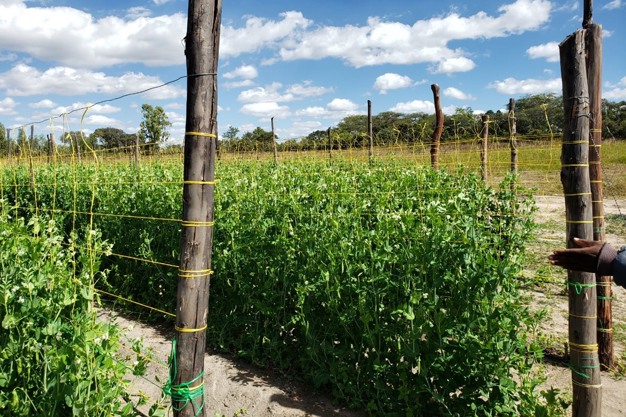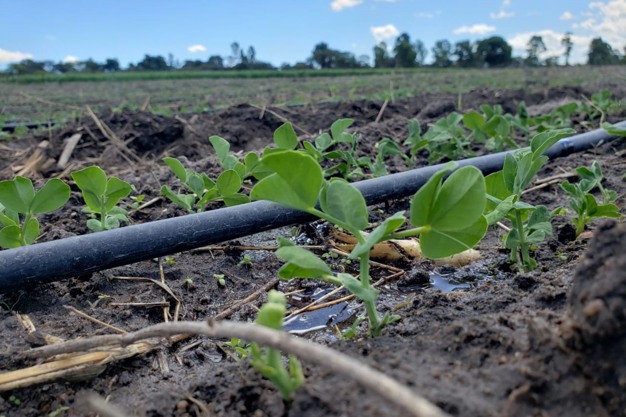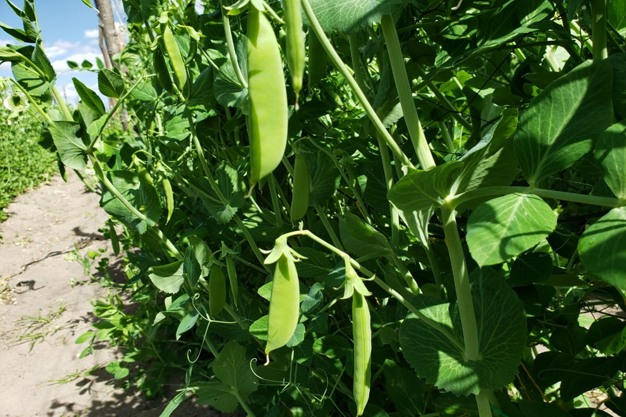Clarence Mwale likes blazing a trail and the new partnership he has forged with a Zimbabwean businessman in the UK has added fuel to his fire. Together they have set up a new company, KUMINDA, and their Harare packhouse has just been completed. This year it will still be mostly packing peas – they're expecting a better pea season – but over coming years their own blueberries will also be packed here.
 Of 60 employees at KUMINDA's brand-new packhouse in Harare, 90% are women.
Of 60 employees at KUMINDA's brand-new packhouse in Harare, 90% are women.
KUMINDA (meaning at the fields in the Shona language) has signed an agreement for exclusive rights to Dutch breeder Fruit Vision's blueberries, which they'll be the first to establish in Zimbabwe. It is set to max out Zimbabwe's already massive advantage when it alone in the Southern Hemisphere (and the world) crops blueberries from January.
"We visited Onubafruit in Spain, and we saw what they do with the cooperatives. We saw that a blueberry plantation can be owned by many families, even hundreds of families, who then employ professionals to run the business. It's a different model from what we have in Zimbabwe at the moment," he explains.
"Imagine blueberry varieties that you can harvest twice a year - it's going to be massive" KUMINDA will be the first to bring capital-intensive blueberries to Zimbabwean small scale farmers; the country's opportunity that time of the year too good to only benefit large and often multinational blueberry producers.
KUMINDA will be the first to bring capital-intensive blueberries to Zimbabwean small scale farmers; the country's opportunity that time of the year too good to only benefit large and often multinational blueberry producers.
Right: KUMINDA's export peas
"Blueberries are not doable to a small-scale farmer until they get serious aid. It will take time, but I have no doubt that it can happen. The Dutch varieties can give us two harvests in a year. We can manipulate it to harvest at a time that suits us. Current varieties are the earliest in the Southern Hemisphere: it's a massive position for Zimbabwe. Then imagine when we bring in varieties that you can harvest twice - it's going to be massive."
Moreover, he says, while blueberry growers in Zimbabwe average 30 tonnes per hectare, these varieties can yield as much as 65 tonnes.
Zimbabwean blueberry farmers have learned a lot over the past five years of growing the crop. KUMINDA is looking for strategic partnerships to put in and even run the blueberries.
"We can grow directly into the soil rather than in pots, or in a trench filled with growing medium in high density plantings. We've been studying this. I think on blueberries our biggest competitor is Peru rather than South Africa, and we want to make use of our advantage as much as possible."
Not only from business point of view but from a love for Zimbabwe
Mwale has a career that originated in compliance and auditing, with a natural segue into production and marketing, with an important slant.
"We're really dedicated to providing opportunities to small and medium scale farmers. Not only from a business point of view, but from a love for Zimbabwe. We like to give them a fair opportunity to participate in global trade."

To bring the edge of critical mass to bear on the export vegetables (peas, French beans, baby corn, sweet corn, amongst others) grown for KUMINDA during summer by their small and medium-sized farmers, as well as to spread risk, they have approached a number of seasoned Zimbabwean vegetable exporters, among them Selby Enterprises and Zimflex, to feed into their large programmes.
Minimal pesticide use in Zimbabwean farming on small scale
"We think that this year we will have a better pea season. Guatemala won't be producing as much, Kenya is out (with the recent flooding), Egypt has already finished. Some, who were buying from Kenya before, have nowhere else to source after the floods. I think that, apart from the demand, it's also because of the natural taste of our products and our better quality. We're growing from land that laid fallow, we have fewer pesticides, and we have low MRLs."

Zimbabwean vegetable farmers have a very good track record on residue levels. "We stopped farming for like twenty years. Pests haven't built as much resistance as they have in South Africa and Kenya. We've never really had an outbreak of thrips or pests, mostly because we haven't been as active in intensive farming as South Africa has been."
He remarks that the availability of cheap counterfeit pesticides is much lower in Zimbabwe than in more populous countries like Kenya.
"Small-scale farmers mostly cannot afford to buy pesticides. It's easier to manage our farms. Our small-scale farmers rarely use herbicides, much more rarely than in Kenya or South Africa. They prefer manual weeding rather than herbicides."
He observes: "I don't know if people recognise that advantage after what we've been through as a country, but it's a good position to be in. One of the reasons we like to work with small scale farmers is their minimal input of pesticides. Because of the economic situation, when you teach them something, they do it right because they know their lives depend on it."
Everyone is literate, he notes, and they keep spray records and fertilizer records, as required by their export farmers' GLOBALG.A.P. SMETA accreditation.
"We've covered a lot of ground, and this is only the beginning," he says. "With the packhouse we've built in Harare, it's going to give massive chances for willing small-scale farmers."
 For more information:
For more information:
Clarence Mwale
KUMINDA
Tel: +263 77 292 9941
Email: [email protected]
https://www.kuminda.net/
